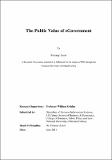| dc.description.abstract | The ultimate question about the success of eGovernment depends on how citizens
perceive its value. Although the literature highlights the primacy of the user in
evaluating Information Systems (IS), little is known about what citizens¿ value in
their experience of eGovernment. Furthermore, understanding success is a complex
challenge in IS, made more difficult when set in the public sector environment. Public
sector evaluation must combine efficiency, quality and reliability with accountability,
openness and the creation of trust. Traditional measures of evaluation are limited
however, as they fall short of reflecting the potential value and impact of technology
on the individual.
The challenge for this study therefore, was to understand the value perceptions of
citizens, in the unique context of eGovernment. The DeLone and McLean IS Success
Model provided a theoretical framework within which to develop a conceptual
understanding of Net Benefits. This study is distinctive however, as it uses Public
Value theory to re-specify the DeLone and McLean IS Success Model, for measuring
eGovernment success. This study also addresses a major deficiency in eGovernment
research, where the views of citizens have been neglected thus far.
This research was structured according to two overall questions. The first question
sought to identify the conceptual dimensions of the eGovernment Net Benefits
construct. Accordingly, the research followed a rigorous construct development
methodology and employed two sets of survey respondents, 90 and 347 experienced
eGovernment users respectively, to confirm a nine-factor structure for eGovernment
Net Benefits. Confirmatory psychometric evidence suggests that the measure is
reliable and valid and that the eGovernment Net Benefits measure can explain a major
portion of the variance in citizens' perceptions towards eGovernment success.
Additionally, the nine-factor structure was re-specified for three identified
eGovernment user groups: Passive, Active and Participatory, in order to better
understand success in specific contexts.
The second question sought to develop this understanding of eGovernment success,
by examining the impact of IT Quality dimensions. Information Quality constructs are
particularly relevant for Passive users of eGovernment and the findings point to areas
where web site designers should focus to ensure quality standards (e.g. the Relevance
and Completeness of information) are met. This research also identified, for the first
time, perceived benefits from eGovernment 2.0 services and the quality features that
affect that perception. The influence of Empathy on Participation is a significant
finding and supports the efficacy of using Web 2.0 technologies to engage citizens.
Maintaining high Information Quality (Relevance and Accuracy) was identified as an
important condition on the success of this impact however. The consequences for
how government agencies construct, maintain and support the quality of Web 2.0
initiatives may therefore be more resource intensive than first envisaged. Finally, a
consistent outcome was the low predictive value of System Quality. Web 2.0
technologies were an important feature of the empirical basis of this research and it is
interesting that other quality constructs appear to have supplanted the expected
explanatory power of traditional perceptions of Ease of Use.
The findings have valuable implications for academics and practitioners in the pursuit
of eGovernment Success. | en_US |
| dc.local.note | knowledge and scholarship in the field of research relating to public sector information systems. Within the context of trends towards eGovernment, the thesis explores citizens' perceptions of eGovernment from a range of perspectives. It addresses two broad research questions. First, it seeks to elucidate the Public Value components of citizen-centric eGovernment. Second, it aims to examine the extent to which IT quality impacts on eGovernment success. Drawing on an established theoretical framework, provided by the DeLone and McLean IS Success Model, the thesis develops a conceptual understanding of Net Benefits. | en_US |


